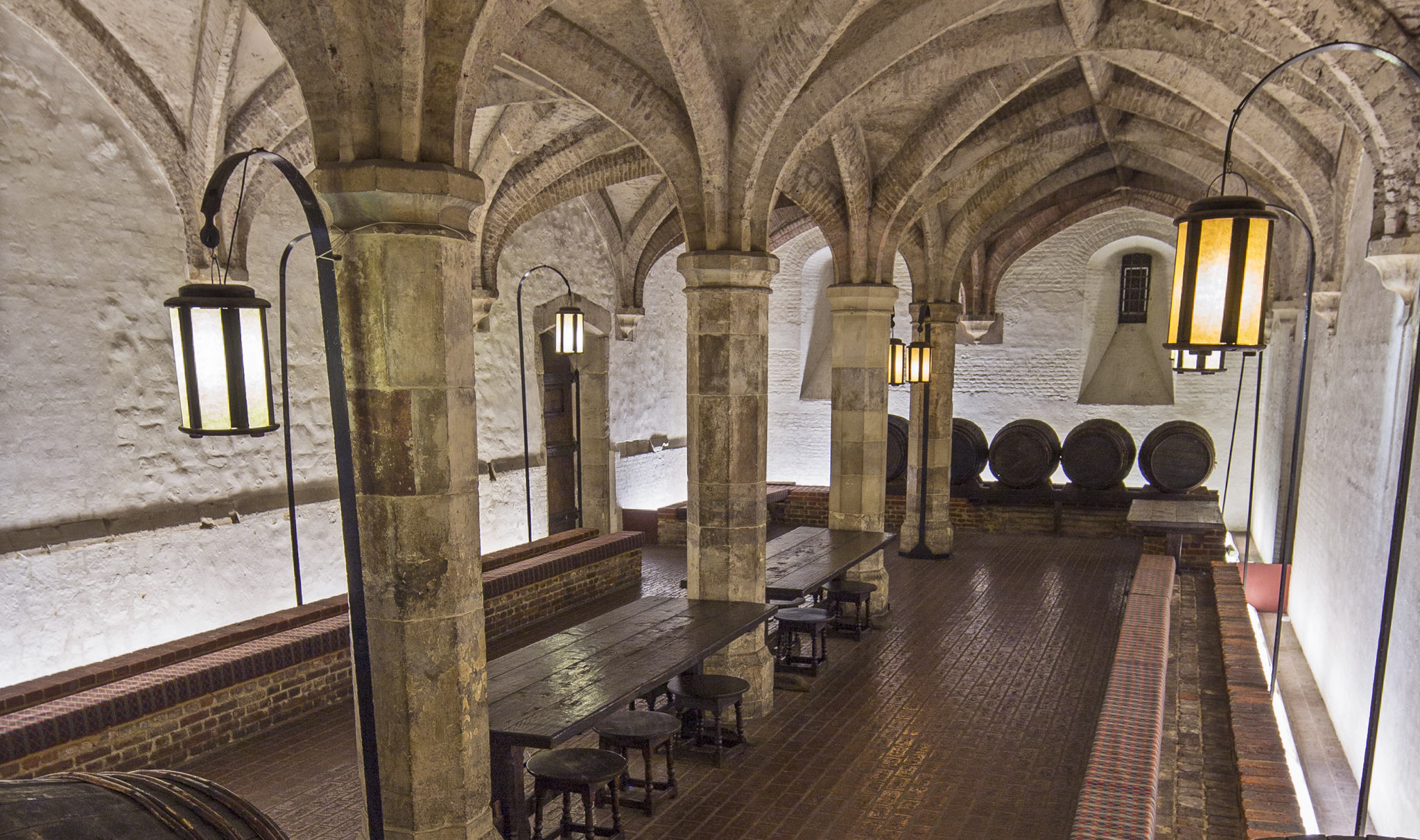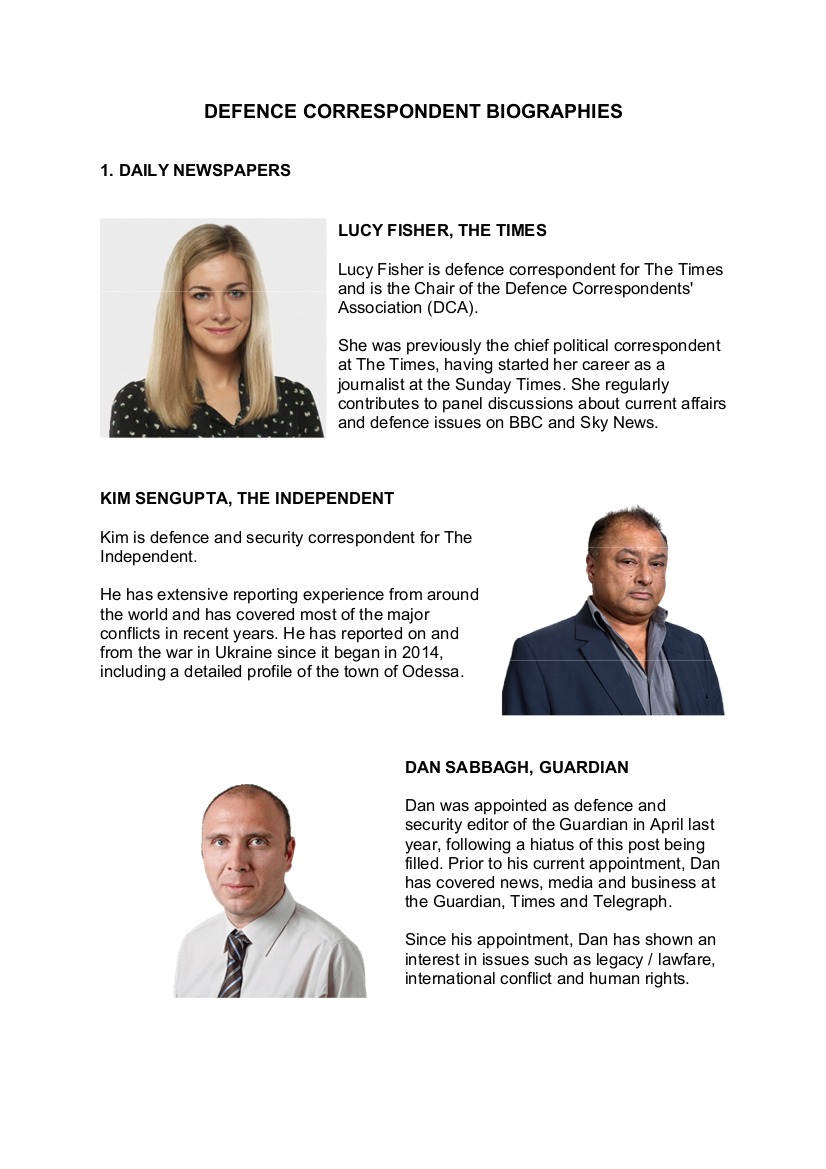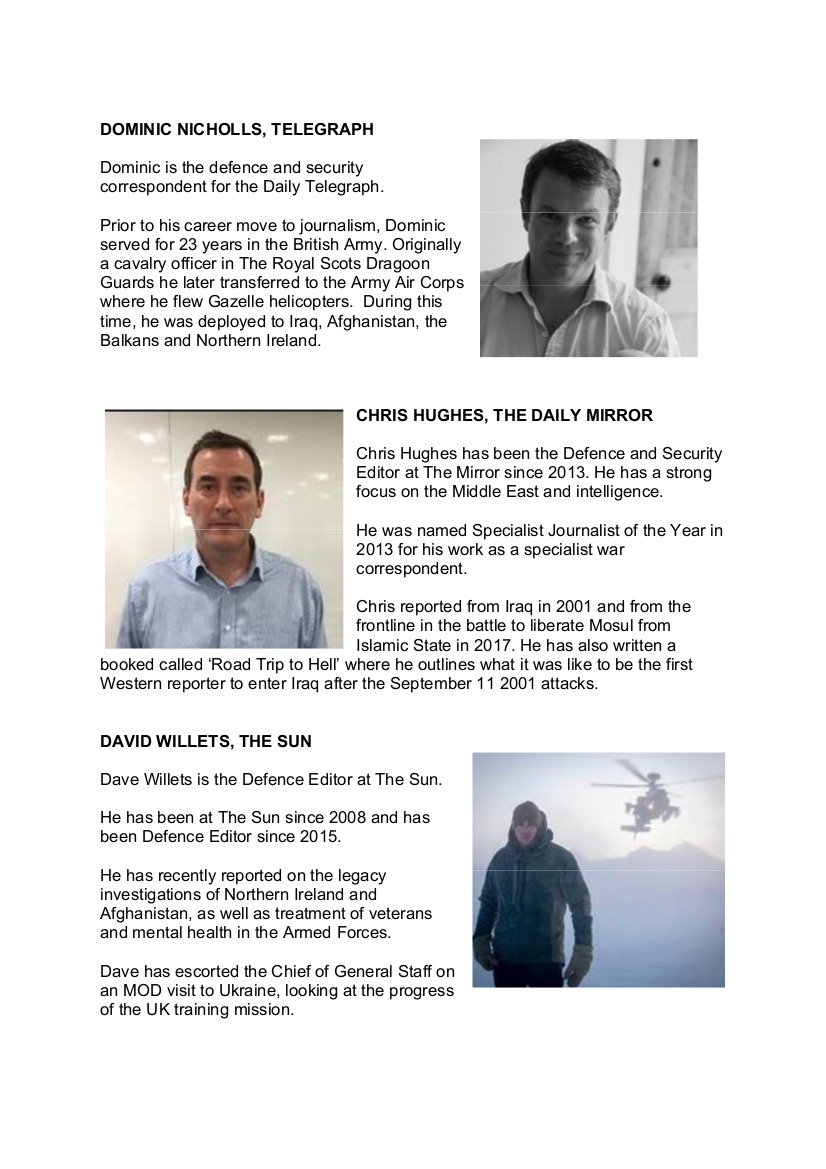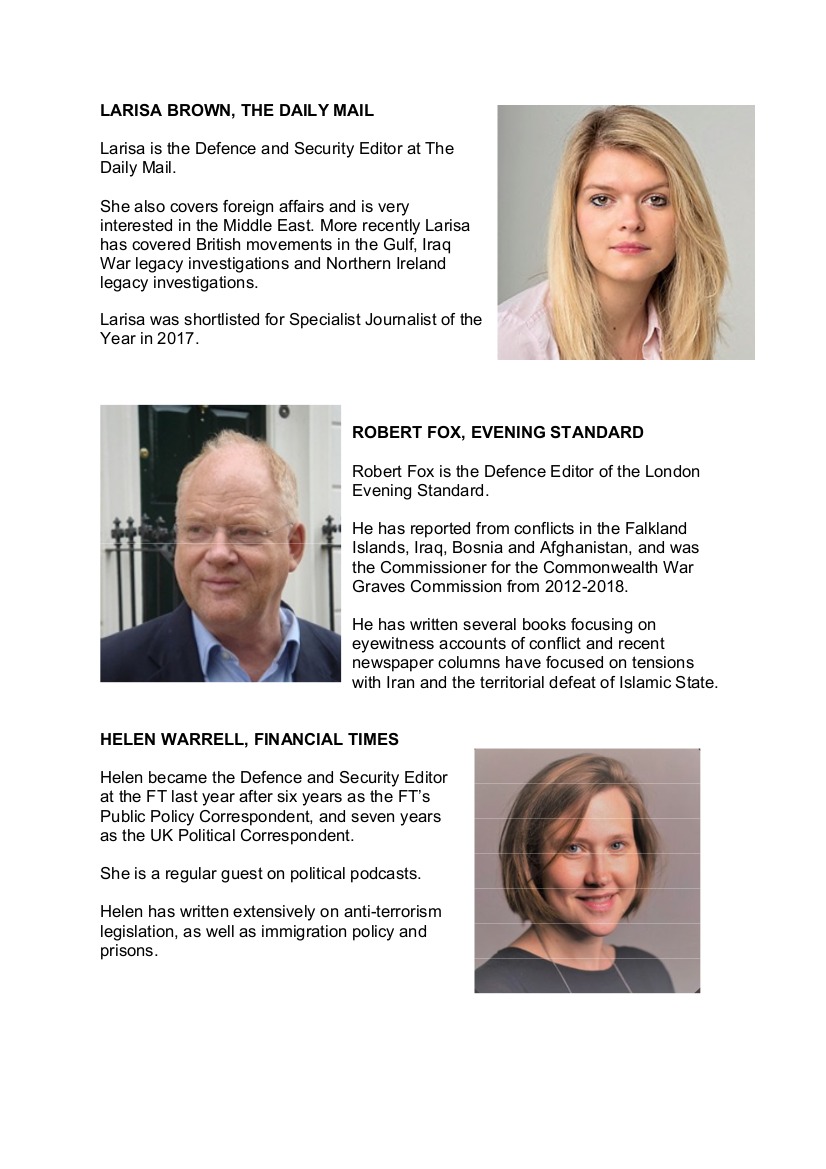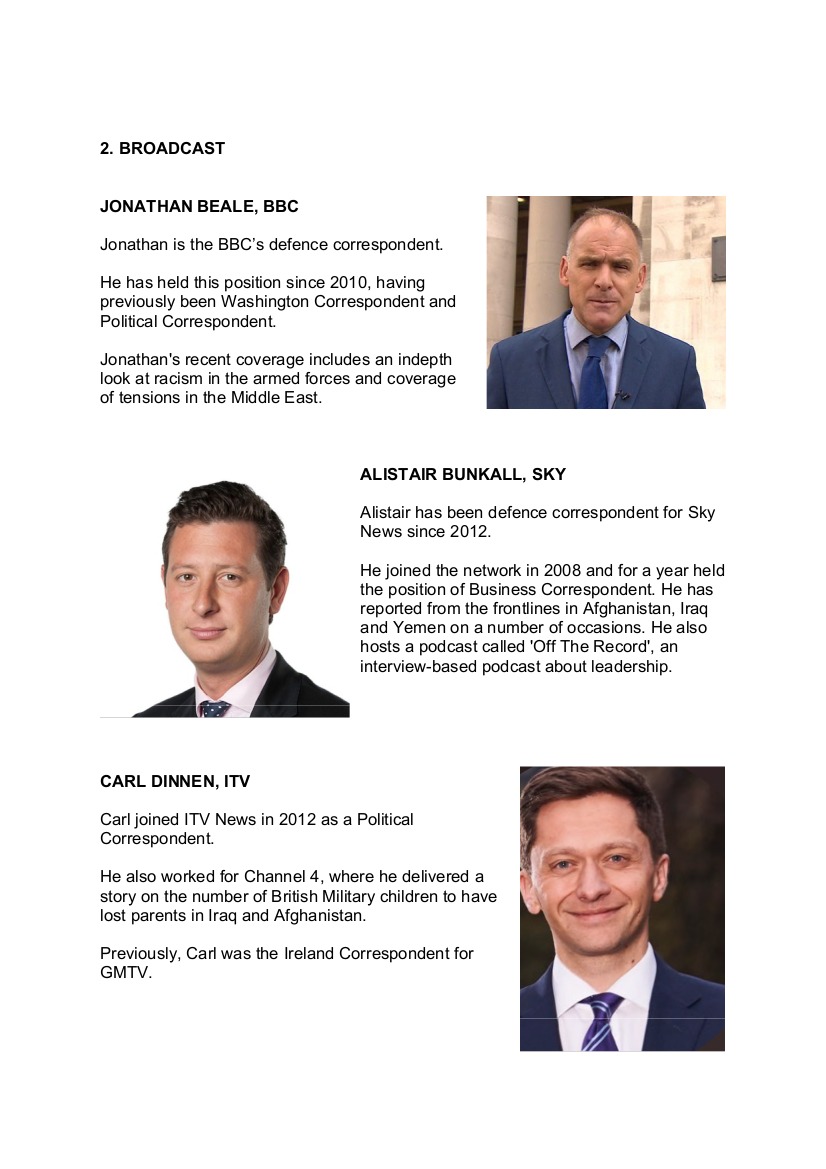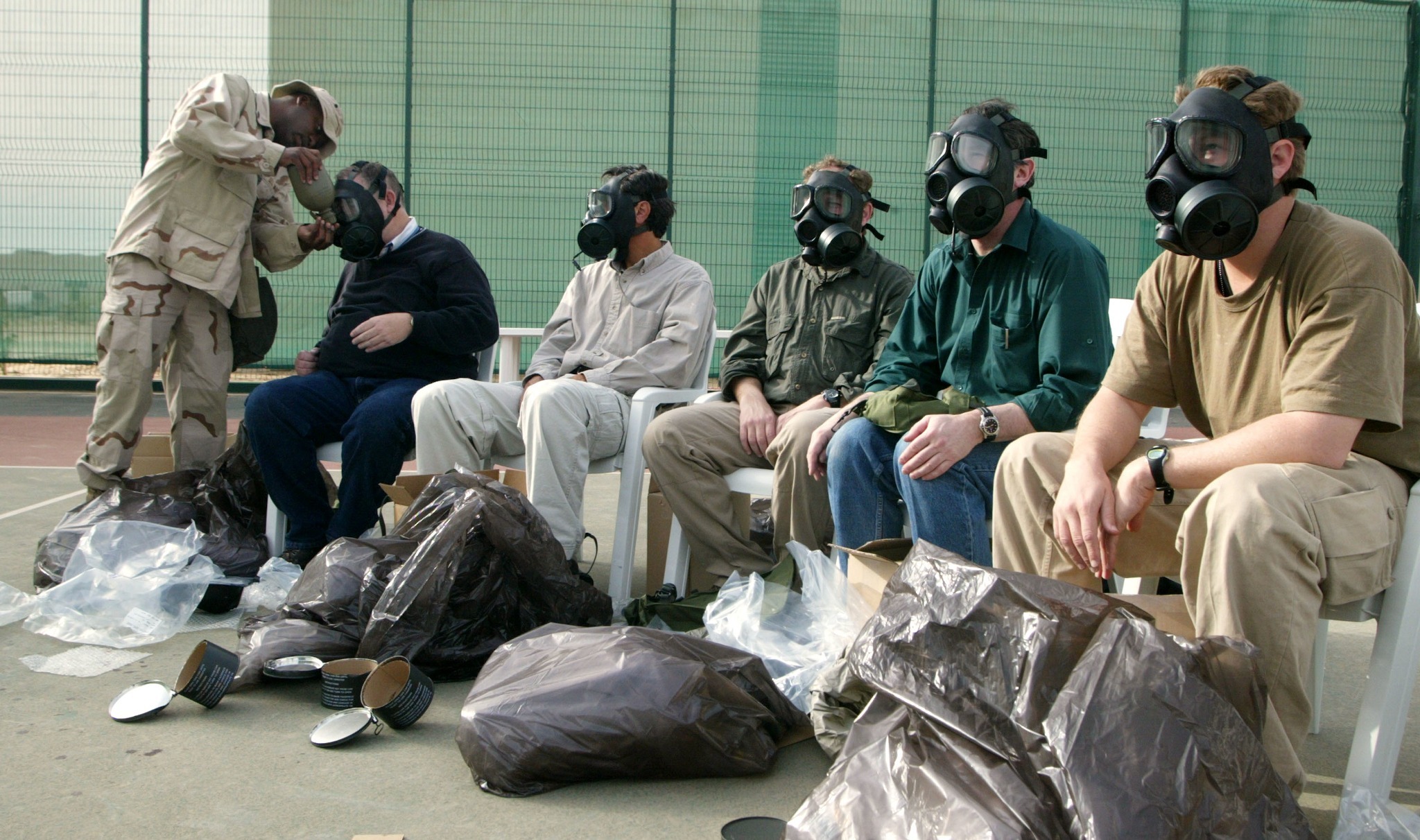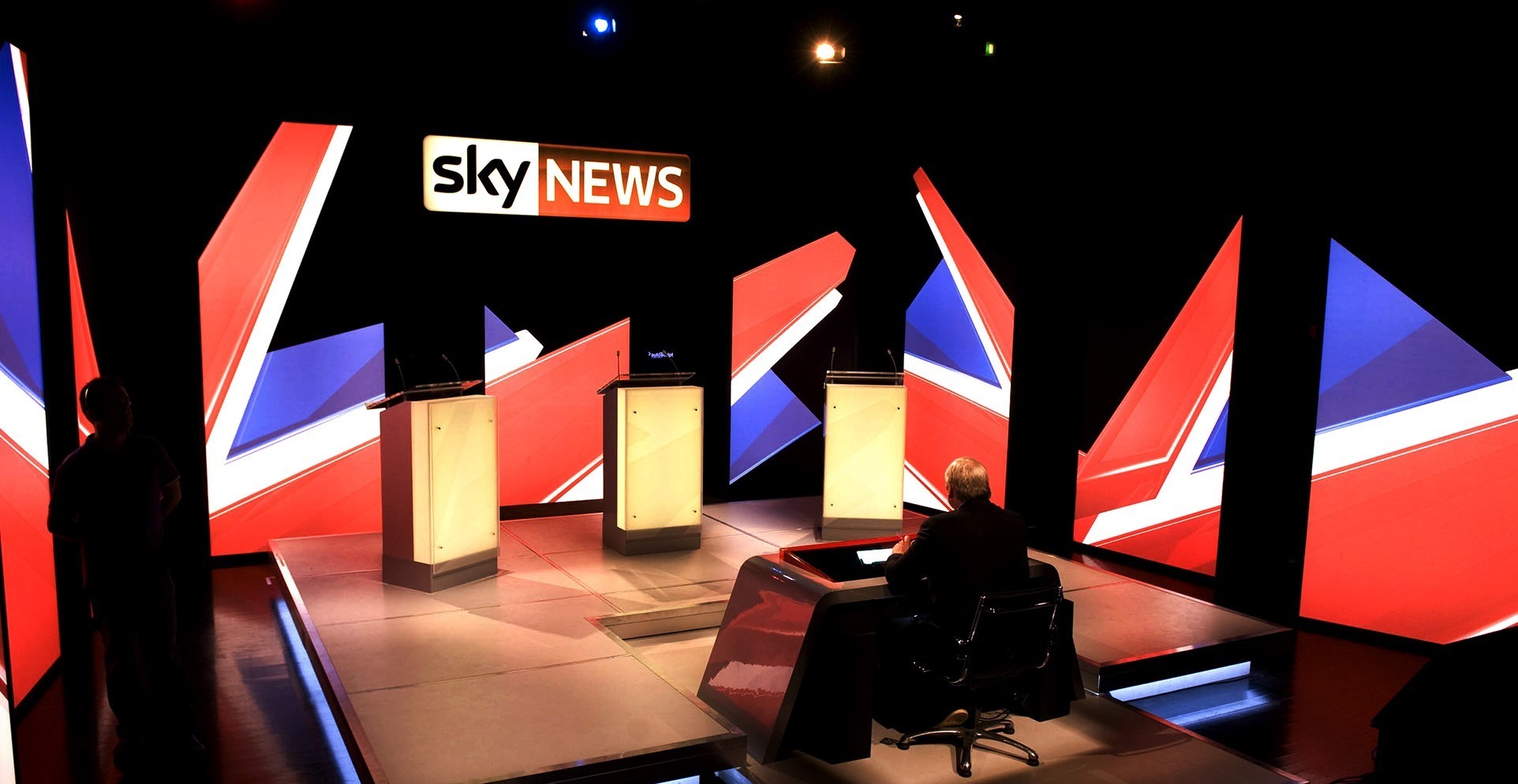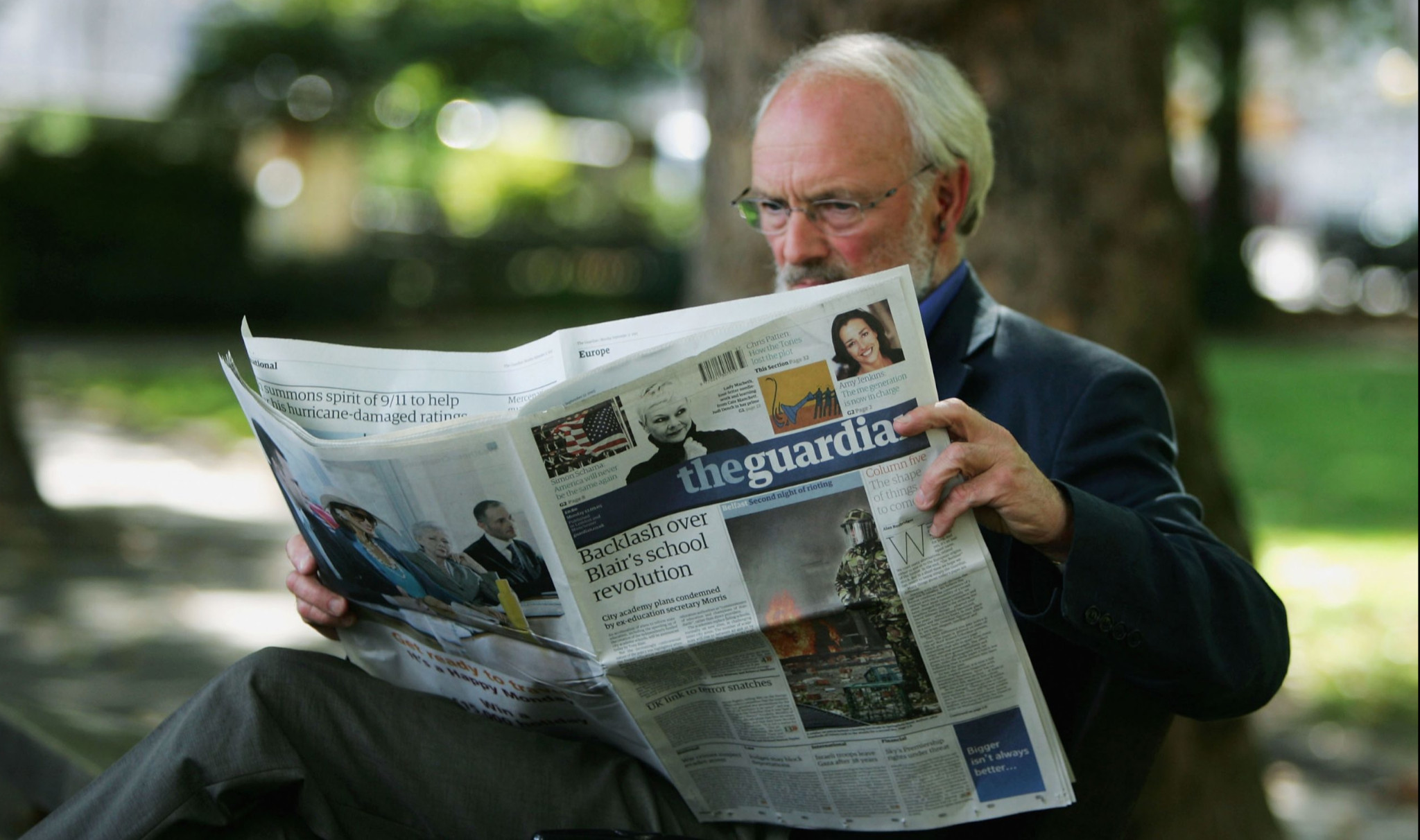One Wednesday night last January, journalists from some of Britain’s biggest newspapers and TV channels turned up at the Ministry of Defence (MOD) headquarters in London. Upon arrival they were taken underground to a Tudor-era wine cellar used by Henry VIII.
After descending to the very foundations of Whitehall, they met defence secretary Ben Wallace. They were not there for a press conference, but an informal, off the record drinks reception.
This was a gathering of the Defence Correspondents Association (DCA). It’s a select club that includes reporters from: BBC, Sky News, ITV, The Sun, Daily Mail, The Times, Telegraph, Guardian, Mirror, Independent, Evening Standard and the Financial Times.
Emails between the group and the MOD have been obtained by Declassified under the Freedom of Information Act.
In one email, the MOD’s chief communications officer told the group’s then chair Lucy Fisher, who was defence editor for The Times: “As you know, we try and hold regular drinks with the DCA and Defence Secretary so you have a chance to speak to him in a more informal environment.”
Reporters who attended the drinks reception were not allowed to take notes. One email stressed “the usual caveats about it being off the record etc.”
At first the MOD censored the names of the journalists who attended the wine cellar event to protect their privacy. Declassified successfully appealed on the grounds that ministers should not give secret hospitality to favoured journalists.
Members of the DCA in January 2020 included a who’s who of British defence journalists:
- Jonathan Beale/BBC - Alistair Bunkall/Sky News (Now covers Middle East and has left DCA) - Carl Dinnen/ITV - Lucy Fisher/The Times - Larisa Brown/Daily Mail (Now at The Times and Sunday Times) - David Willetts/The Sun - Dan Sabbagh/Guardian - Kim Sengupta/Independent - Helen Warrell/Financial Times - Dominic Nicholls/Telegraph - Robert Fox/Evening Standard - Chris Hughes/Daily Mirror - John Ingham/Daily Express
In the club
The DCA was founded in 1992 by an anxious defence reporter at the Daily Telegraph, Peter Almond. He was concerned editors had lost interest in the military after the Cold War and specialist defence correspondents were being sacked.
By 2000, Almond had grown frustrated with the group’s lack of access to the military, complaining that the “secrecy culture within the MOD [was] too strong to make more than just a small dent in media relations.”
Since then the DCA has come and gone. The current version was apparently revived by Fisher at a meeting with colleagues from the Mirror and The Sun in the Frontline Club in London.
One journalist in the group, who spoke to Declassified on condition of anonymity, downplayed its importance: “Whether the DCA existed or not there would be ministerial drinks, it’s a pretty standard thing. There’s a WhatsApp group that would exist anyway. It’s not massively active. We have a social once or twice a year. There’s no money involved, no one pays a subscription.”
But some military officials do regard the DCA as a more formal organisation than its members may appreciate. “The MOD talks about holding DCA briefings,” the source reflected. “They seem to see it as a bit more of an entity – I just think we’re just a bunch of reporters. So I slightly wonder why.”
Other sectors of the media have similar groupings. There’s a Crime Reporters’ Association, which the Leveson Inquiry heard “exists to maintain and improve relations with the police.” It’s been going since 1945 and is seen as an “institution” by police and reporters alike.
Cartels
Richard Norton-Taylor, a Declassified board member and former Guardian defence editor, remarked on the DCA in his latest book. He commented: “Official spokespeople in government departments like to deal exclusively with the journalists’ lobby groups assuming their members could be trusted not to rock the boat. They assume journalists prefer to operate in cartels.”
Norton-Taylor said his experience as a defence correspondent “frequently reminded” him of the ditty: “You cannot hope to bribe or twist, thank God, the British journalist. But seeing what that man will do unbribed, there’s no occasion to.”
There is no formal vetting process for DCA membership, beyond being a defence correspondent for a national media outlet.
Former naval commander Tom Sharpe has said that the DCA “can be trusted to honour the requirement to maintain operational security”. He said “selected elements” of the group could even be invited onboard a Royal Naval vessel during a dangerous transit off Iran.
Once part of the club, there are some mechanisms the MOD can use to keep DCA members in line, and this is where a journalist told us “it becomes a pain.”
“The MOD will organise a briefing on some sort of topic…They’ll say that everything is on deep background but maybe you can come back and see if we can get some quotes approved. Typically MOD turns them all down, or almost all of them down.
“And everyone goes what the fuck was the point of that? Why do we have to play this game where we have a whole load of off the record stuff and you’re told you can’t use it? I’ve heard it said that they refer it up to Number 10, and Number 10 says no.”
“Anything that’s more hostile to China they will not sign that off. If someone says ‘we’ve got deep concerns about the way China’s behaving in the South China Sea’ – if it’s a bit beyond the official script, they will not indulge that.”
The journalist added: “If it was a one-on-one conversation you could say ‘a defence source said’. But the problem is the DCA can be like a closed shop. Suddenly someone says we can’t quote any of this and you can’t break ranks without pissing off colleagues and that’s where it becomes problematic.
“At that point you think why the fuck am I here? Why the fuck am I involved in this bollocks? It’s not the DCA per se that causes that problem, it’s the MOD’s terms.”
One result of this process, especially when combined with embargoes requiring DCA members to share a common deadline, means that “a groupthink kind of emerges”, the source said. “The ‘hack pack’ mentality. This is what the story is and this is how we are going to do it.”
Petty
If you break ranks, there are consequences. “Ben Wallace gets cross with people who write things that he doesn’t like,” the source said of Britain’s defence secretary, a former army captain and arms firm director.
“And then he’ll exclude you from a future briefing or something like that. Ben can be quite petty. If someone writes a story based on something he tells you he gets grumpy about it. He likes the company of journalists but he doesn’t like the end product. It’s an unusual combination.”
Writing stories critical of the military led to Declassified being blacklisted. After launching in late 2019, we published a string of articles based on official records that exposed extensive British military support for repressive regimes in the Gulf and beyond.
By August 2020, a British soldier who read Declassified was arrested in Whitehall for protesting against arms sales to Saudi Arabia.
The MOD press office happily gave a comment about the incident to Dominic Nicholls at the Telegraph. Nicholls is a DCA member and former cavalry officer. At the same time, Declassified was told by the MOD “we no longer deal with your publication.”
This stance drew criticism from the National Union of Journalists, the Society of Editors and even the Council of Europe’s media freedom wing. The backlash forced Wallace to apologise to Declassified in Parliament. He also asked Tony Blair’s former spin doctor, Tom Kelly, to investigate.
Blacklisted
Kelly’s investigation found the MOD’s communications director, Carl Newns, regarded Declassified as a “hostile website, rather than a proper news organisation.” Press officers working under Newns believed he had “sanctioned a blanket ban” on contact with us.
An unnamed military officer even proposed Declassified be “put on a list of organisations which the department would not engage with.” Newns jumped ship shortly before the report’s findings were announced to parliament.
Wallace claimed he had no knowledge of what had gone on – but his prickly behaviour towards even the DCA suggests it would not have been out of character.
When an MP asked for more details about the military officer behind our blacklisting, Wallace refused to comment. Contrary to the inquiry’s report, he insisted the service member had done nothing wrong.
The DCA, for their part, blissfully ignored the entire affair, apart from the BBC’s Jonathan Beale who tweeted in support of the MOD.
A year later, Declassified saw Wallace at an arms fair with the Saudi ambassador to London. I called out questions to him on camera about whether his relationship was appropriate, given the murder of journalist Jamal Khashoggi.
My pass to the Conservative Party’s annual conference was subsequently revoked.
Revolving door
Clearly, the MOD goes to great lengths to manage the military’s public image. Every warship, RAF squadron, and army base seems to have its own social media account, ready to amplify the MOD’s message. One survey found the main MOD twitter account was the most active UK government department on the platform.
Its press office, the “Directorate of Defence Communications”, employed 89 staff in 2017. That included 19 service personnel, such as a nuclear submarine commander. This provides the media with a level of technical detail that a defence journalist said was “bloody useful”.
Britain’s former ambassador to Afghanistan, Sherard Cowper-Coles, has remarked that “because defence correspondents are especially dependent on the military” for access to information “they can risk becoming little more than unofficial military spokesmen.”
Some defence correspondents are even willing to become official MOD spokesmen. David Willetts was a DCA member and defence editor at The Sun. The tabloid runs an annual ‘Millies’ awards to show its support for troops fighting in Iraq and Afghanistan.
After years of providing this kind of coverage, Willetts left The Sun and became deputy head of press at the MOD, quickly rising to head of ministerial communications. You wouldn’t know this from his Twitter profile, where he modestly describes himself as a “Former journalist. Interested in defence.”
A DCA member said: “Willetts is de facto spokesperson [for Ben Wallace]. He feels like the head of department to us – he’s the guy you go to and ask what’s going on, can you give me a steer on this. He’s very helpful. He’s the Secretary of State’s spokesperson.”
Such a close relationship between the military and the media looks like a revolving door. “I think Dave is really professional, independent minded and very good and wouldn’t have a bad word against him,” a journalist said. “But it does look cosy, I can’t dispute that.”
Willetts is now leaving the MOD to do PR for a gambling industry lobby group.
‘Propaganda’
A classic example of defence journalists acting as unofficial MOD mouthpieces came in February when the Telegraph was flown to Ascension Island with a covid vaccine delivery.
“It’s bloody miles, it’s a right old trip. I think they had to quarantine a bit when they were on the ground. And what were they writing? ‘We delivered some vaccines!’,” a fellow reporter commented, mocking the trip to the mid-Atlantic atoll.
Meanwhile, The Telegraph triumphantly titled their exclusive: “RAF’s daring race against time to vaccinate Ascension Island in world-first mission.”
“They would call it a good news story but it’s just propaganda,” one source remarked. “And that is an element of what they [defence correspondents] do. The BBC can be the worst. The BBC in aggregate can take a lot of tame MOD stuff.”
This appears to be an issue common to conservative and liberal media. Declassified has closely analysed the Guardian’s national security coverage. And our research on Sky News shows the organisation also acts largely as a platform for the MOD and Foreign Office.
Some defence journalists are wary of how the MOD tries to control the media narrative. “There’s a bit of stuff that it wants to be transparent about, but beyond that there’s just a big core of stuff that fundamentally it doesn’t want to talk about,” a media source said.
“If it’s in any way controversial it really doesn’t want to help you. They will obscure, cover up and lie – that’s the truth. And they will do that possibly for years and forever. You can’t have a sensible discussion with them about civilian casualties from bombing in Iraq and Syria. They say there’s only one. It’s just bollocks.
“Everyone knows the British figures don’t stand up, and they will barely debate it with you. And they’ll get grumpy about it. The job is to get around all that. But there’s this sort of impenetrable fog. Quite quickly you get into that impenetrable fog and you’ve got half a story and scraps of information and they’re not going to help you put it together. And that’s the problem.”
“They will obscure, cover up and lie – that’s the truth.”
Embeds
For those journalists willing to play the game, the perks are considerable. But membership of the DCA alone is not enough to become embedded with the troops on foreign trips.
“The MOD does that and it’s all signed off by Ben [Wallace]. It’s a highly politicised process,” a journalist said. “With trips, the department plays favourites, as do other ministers – Priti Patel does the same. This aspect is very political.”
“Ben refused point blank to let anyone go to Kabul in the summer, and we all asked. And of course people found a way to get there using other contacts. We were all like can we do an embed? This is the biggest thing for years, this is such an important moment.”
One trip was particularly prized: naval ship HMS Defender’s transit through the Black Sea. The BBC’s Jonathan Beale and the Daily Mail’s Mark Nicol were on board the British destroyer when it was buzzed by Russian jets guarding their illegal occupation of Crimea.
The Mail splashed excitedly: “MAILMAN ON SHIP AS PUTIN GUNBOAT OPENS FIRE”. Readers were assured “the UK warship is here to uphold international law.”
“They didn’t know that was going to happen but it was obviously ‘the Crimea Stunt’,” a fellow reporter said. “It was fantastic for both of them and all the rest of us are going ‘ah you bastards’ in the usual sort of way.”
Secret MOD documents planning the voyage were later found dumped at a bus stop in Kent. They showed HMS Defender could have taken a safer route and that sailing so close to Crimea was likely to provoke a Russian response.
Military planners even noted the value of having journalists on board as “an option for independent verification of HMS Defender’s action”. While the BBC reported some details from the document dump, they did not publish parts about UK special forces in Afghanistan, and soon returned the papers to the MOD.
Selective concern
The DCA’s appetite for stories about Russian violations of international law or Chinese aggression in the South China Sea highlights a groupthink towards the MOD’s worldview.
Days after the HMS Defender incident off Crimea, her carrier strike group was exercising with the Israeli air force. None of the DCA questioned why the same law-abiding navy was now on the side of a power that is blockading the Gaza Strip, has annexed the Golan Heights and East Jerusalem, and builds settlements in the West Bank – all in violation of international law.
Nor did the “independent minded” members of the DCA call out the aircraft carrier group’s subsequent stop off in the Chagos Islands, which the UK is illegally occupying from Mauritius.
Such selective reporting is rewarded. Jonathan Beale and Sky News’ Deborah Haynes were invited onto aircraft carrier HMS Queen Elizabeth at its new base in Oman last month.
Neither of them questioned why the Royal Navy was building bases in a dictatorship with no free press – where Declassified had just revealed British troops had tortured dozens of detainees in the 1970s.
Turning a blind eye to the British military’s consistently anti-democratic role in Oman is typical of British defence correspondents and the UK media more widely. Despite Oman being an exceedingly close British military and intelligence ally, there are almost no national media stories covering the relationship.
The Foreign Press Association’s recent annual awards ceremony even had the Omani regime as its “gold sponsor”. This did not put off entries from journalists at the BBC, Channel 4 News and FT.
ITV’s Robert Moore received “journalist of the year” from Oman’s ambassador while Guardian contributor Samira Shackle was awarded “tourism story of the year” by another Omani official.
Acceptable criticism
Defence correspondents do produce some coverage critical of Britain’s military that holds the MOD to account. Veterans’ mental health, rip-off visa fees for foreign-born troops and bungled equipment contracts like the faulty Ajax armoured vehicle are often reported.
Larisa Brown, the current DCA chair, frequently highlights sexual harrassment within the military for The Times and Sunday Times. Mark Nicol at the Mail exposed sexual abuse in a military initiation ceremony.
Yet even reports aimed at protecting the troops seldom go very far. Coverage of inquests is patchy, with no systematic effort by the DCA to attend hearings of fallen service personnel.
An inquest into the death of Captain Dean Sprouting, held in Oxford, was only attended by the Morning Star and a stringer from a local news agency. It emerged that Sprouting’s death on an airbase in Iraq was caused by careless US troops running him over.
Another inquest, this time into the death of Sergeant Matt Tonroe, held in Hereford, went unreported until the Morning Star obtained the recording. It revealed the SAS soldier was killed in Syria by friendly fire, and not by an ISIS bomb – contrary to what the MOD and Pentagon had said after his death.
Of course, journalists cannot be expected to cover everything. Even when they do, editors may spike their copy.
But these two inquests were hardly marginal events. At the time they concerned the only UK personnel to die on operations against ISIS. And Britain’s smallest national daily paper, the Morning Star, which has no dedicated defence correspondent, broke both stories.
Killing civilians
Some of the most critical coverage of the MOD in recent years has come from reporters who aren’t dedicated to the defence beat. Allegations the SAS executed civilians in Afghanistan were revealed by the Sunday Times insight team and BBC Panorama.
The Guardian recently ran a frontpage story by their defence editor Dan Sabbagh about MOD payouts for civilian casualties in Afghanistan. An important story – but the research was done entirely by a charity, Action on Armed Violence.
The shocking inquest ruling into the death in 2012 of Agnes Wanjiru, a Kenyan woman last seen alive with British soldiers before her body was found in a septic tank, was eventually picked up by general news reporters at the Sunday Times – nearly two years after the verdict.
Wider issues about British army conduct in Kenya – such as their £67,000 payout to a 13-year-old boy who lost both arms and an eye in an explosion at a training ground in 2015 – are yet to be covered by any of the main national newspapers.
And no members of the DCA appear interested in asking broader strategic questions about the size and purpose of the UK military. For instance: Why does the British army still need military bases in Kenya sixty years after colonialism ended?
The official reason, that it’s necessary for training, is undermined by internal army documents that show a “secondary aim” is to let soldiers see Kenyan wildlife.
When Declassified revealed the scale of Britain’s overseas bases network – 145 sites spanning 42 countries – it was picked up only by the Sunday Express. Their defence editor ran it as a good news story.
Recent rumours the army was moving a tank training ground from Canada to Oman were met with alarm in the press. So much so that the MOD’s media rebuttal team had to reassure reporters that both bases would in fact remain open.
The rationale for two new aircraft carriers also encountered very little investigation by defence correspondents, beyond some criticism of the enormous costs involved. Military planners justified the vessels on various grounds, such as defending the Falklands and reducing the need for overseas bases.
Yet the Falklands was not invaded in the decade from 2010 to 2020, when the navy had no aircraft carriers on active service. And the new carrier fleet actually led to overseas naval bases being built for logistics support, like the one in Oman (and another in Bahrain that was too shallow).
And on one of the most controversial defence issues of our time, the proposal to shut down all criminal and civil investigations into killings by security forces in Northern Ireland, defence journalists have largely acted as cheerleaders for the plan – even though Wallace himself harbours doubts.
Alistair Bunkall was approached for comment but declined.

